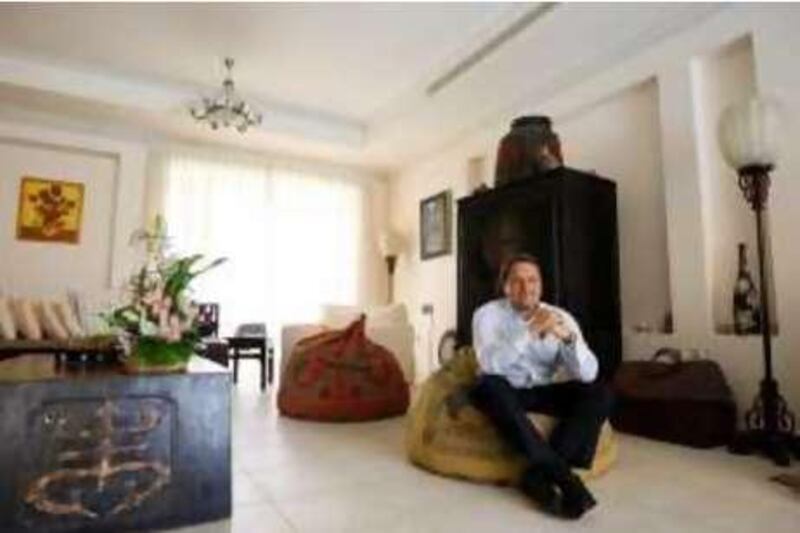An old Chinese commode might not seem like the likeliest place in which to store a television set, but the Asian-style living room of Adrian Rudin is full of surprises - such as an antique Chinese opium bench. "I picked this up in Singapore," says the Swiss-born general manager of the Shangri-La Hotel. "They actually come without the cushion covering normally," he says, lifting up the beige sofa seating to reveal a wicker panel. "But we put one on. It's a good bench for just relaxing on and sleeping."
For a man used to working 12- and 14-hour days, this is a welcome ethos to bring into the home that he shares with his wife, Nat. "This is my favourite room because when I come home, it's the room I love to relax in. I hide the television in the Chinese chest but I do watch it - comedies, CNN, anything really. It's the industry norm to work long hours, so going home to unwind is important." Since he spent most of his working career in China, Thailand and Singapore, one thing that is perhaps not so surprising is the one-time chef's choice of decor.
"These days, there's not much stuff from Switzerland in my home. Just this," he says holding up a small painting of a mountain scene. "It's not really home anymore. I've been working abroad for so many years, and as you can see, most of my furniture is from South East Asia. "I go home once a year to go skiing and see family, but I treat it as somewhere to go back for a holiday. I can't see that work will take me there, but then, you can never say never."
He has been at the hotel since it was little more than a lattice of scaffolding. Then, he gave his staff mountain bikes with which to traverse the one-kilometre-long site. "That must be the Swiss part of me coming through, the mountain bikes," he says, laughing. The traffic, at least, isn't an issue for this particular Abu Dhabi professional. His home lies a short distance from the hotel complex. In fact, when the hotel was at its building stage, the house next door was used as the pre-opening office until the main complex was ready.
But what brought this lover of all things Oriental to the Middle East? "Well, I had worked all over. After I worked in Switzerland as a trained chef, I decided to do something more with my career, so after working for three years in high profile places like St Moritz, I went back to school for four years. Then I looked for opportunities abroad and received an offer from Hong Kong." He worked first for The Peninsula Hotel in Hong Kong as the executive sous chef before going into management and overseeing the renovation of the hotel. It was during this time that his obsession with collecting furniture pieces began. "I love Oriental things and the lifestyle; in Asia the lifestyle is just so different, especially to Europe," he says." I just really, really enjoyed it."
He met his wife while he was the director of food and beverage at the Mandarin Oriental in Bangkok. "She runs a chain of restaurants," he says. Next, he was offered a job at the Shangri-La in Hong Kong, where he spent five years in charge of food and beverage and then became the resident manager. After his two-year stint in Singapore, the hotel group asked him to the Middle East. His villa, like many in the Middle East, is spacious. "Compared to Hong Kong it's huge - there my apartment was only 70 square metres, so it wasn't a big place, but it was sufficient for a young guy starting out his career. We've realised it's going to be quite difficult to go back with all these things, because we'll probably not have as much space as we have here ever again."
He points out an ornate Vietnamese chess on a Chinese lacquered table. "The chess set I bought on my last holiday to Thailand. My uncle used to live in Shanghai years ago and he played a game of chess with a friend by post. It used to take them about a year to complete. These days, people play online, but I still like a face to face game now and then." He admits that he is always on the lookout out for new and original things to bring back. "Whenever I travel I try and get some mementoes back, some art," he says, indicating a red chest from Tibet adorned with stone Buddha heads and statues of Tibetan monks, as well as several dragon heads from various countries.
"I'm a dragon in the Chinese zodiac, so I have a lot of dragons," he says, pointing at a fierce jade dragon head from China. He looks at the Chinese cabinet, on which is perched a large black container emblazoned with calligraphy. It's a Thai rice bin, and is guarded by a small stuffed dog that looks like it has had a lot of love. "The stuffed dog is called Rattler. It's from 1930, a Steiff toy. My uncle used to trade in Shanghai before the Second World War. It was his travelling mascot. My auntie gave it to me when I moved to the Far East. When the Japanese invaded Shanghai, he had to flee and he took a boat back to Switzerland. It took him 18 months to get back home." It looks like it might take the Swiss chef, hotelier and traveller a lot longer, if ever, to return to the mountain scene in the small picture, resting forgotten on the mantelpiece.





